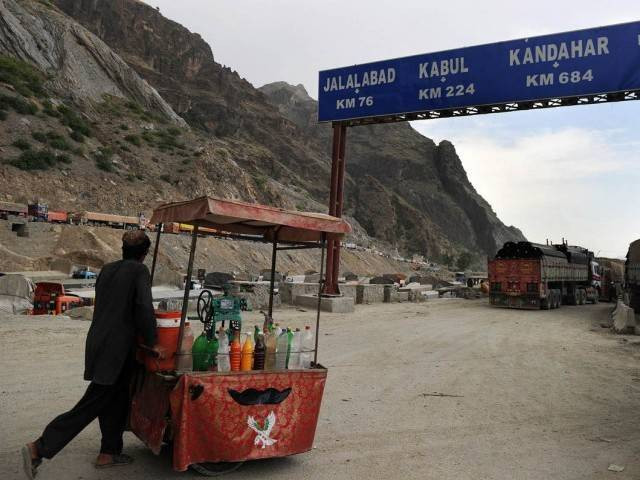Afghan traders seek another border crossing near Torkham
Ambassador Sadiq says trade diplomacy should continue irrespective of political environment

Traders and relevant officials from Pakistan and Afghanistan on Thursday discussed issues related to improvement in the bilateral trade flow and pledged to keep economics and trade detached from politics for regional stability and sustainable development.
The fifth Pak-Afghan Trade and Economic Connectivity Focused Group Discussion (FGD) was spearheaded by the Centre for Research and Security Studies (CRSS) and the Pakistan Afghanistan Joint Chambers of Commerce and Industry (PAJCCI).
During the discussion the Afghan side proposed the opening of another border crossing near Torkham and complained about the scanning issues. The Pakistani side told the delegation that the issues had been addressed to a larger extent.
Prime Minister’s Special Representative for Afghanistan Ambassador Muhammad Sadiq told the forum that Islamabad and Kabul have taken some principled decisions within last six months in order to move forward in an organised way.
Ambassador Sadiq said that Pakistan has issued around 80,000 visas to Afghan citizens, including a few for less than one-year period. “Students are getting visas for the entire time period of their scholarship,” he added.
“This shows things are moving in the right direction, though we have to be patient. Complex issues accumulating over years would take some time for resolution; we should not lose any gains made so far,” he added.
The envoy emphasised that trade diplomacy should continue irrespective of political environment, and stressed that reciprocity should be positive. “A tit for tat approach be avoided, and the common man should not bear the brunt of something done by an individual or a group,” Sadiq said. “Moreover, parliaments of both the countries are now on-board.”
Khan Jan Alokozai, Chairman PAJCCI and Vice Chairman Afghanistan Chambers Federation told the forum that traders on both sides of the border were highly appreciative of the “swift and positive developments” over the course of last few months.
“Islamabad and Kabul now seem committed more than ever to resolve issues of mutual interest in a structural manner. It is the beginning of new chapter of economic connectivity and enhanced trade between two countries,” Alokozai said.
He appreciated the appointment of special envoys to expedite the progress on the bilateral issues. He cautioned that positive gains should not be short-lived and stressed that both sides have to continue bilateral engagements with the goodwill to move forward and not be the prisoners of history.
Shinwari, a former finance minister of Afghanistan, called for Pakistan to work on making businesses for the Afghan traders “a lot easier and cheaper”, saying: “We should be sharing real time data regarding trade and transit to minimise structural hinderances, obstructing the traffic flow across the border.”
The Afghan delegation was of the view that Pakistan might consider utilising another crossing point, called Khwar, right next to Torkham, to allow uninterpreted flow of trade and transit.
The delegation members suggested that if cement and coal transportation was diverted entirely to the Ghulam Khan crossing point, it could significantly reduce traffic congestion at Torkham and Chaman crossings.
The Afghan side complained about the scanning and tracking issues. However, Pakistani government officials at the discussion replied that the issues had been resolved to a certain extent, adding that expression of interest (EOI) had been invited to involve more private companies in the process.
“To facilitate bilateral trade and transit, joint checking of the vehicles has started,” said a representative of the Federal Board of Revenue (FBR). He also informed the forum that the FBR had sent a details report to the ministry of commerce for operationalisation of Ghulam Khan crossing point for transit.
The Afghan delegation included Soltan Muhammad Safi, Vice Chairman, Afghanistan Chamber of Commerce and Investment; Tor Malang Shegewal, Chairman Nangarhar Chamber of Mines and Industry; Parwarish Oryakhail, Vice President of Afghanistan Women Chambers of Commerce and Industry; Naqeeb Ullah Safi, Executive Director, PAJCCI; Sameena Wadeer, Commercial Councilor, Embassy of Afghanistan, Islamabad; Bahram Mohammadi, Second Secretary, In charge Economic Affairs, Embassy of Afghanistan, Islamabad, and Babrak Akbare, an Afghan businessman.



















COMMENTS
Comments are moderated and generally will be posted if they are on-topic and not abusive.
For more information, please see our Comments FAQ